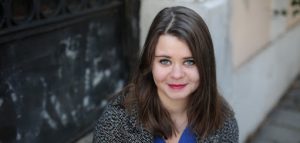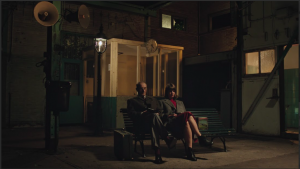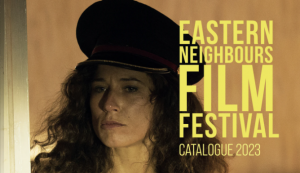
Waking Up in Silence
dir. MILA ZHLUKTENKO, DANIEL ASADI FAEZI
DUTCH PREMIERE
Ukrainian children are confronted with their past as they explore their new home in Germany: a former military barracks.
The old German military barracks now serves as a refugee camp for people from Ukraine. The film follows the children on their journey, where their own history intertwines with that of the barracks. Through the eyes of its young protagonists as new arrivals in Germany, the documentary shows a moment between past and future, war and silence, departure and arrival.
SHOWTIMES | Triple Feature: Ukraine/Mostar Spotlight with Avitaminosis & Deserters
Saturday, 25 November – 14:00
PROKYDAYUCHYSʹ U TYSHI | 2023 | 18 min | Germany, Ukraine
| PRODUCTION | Mila Zhluktenko, Daniel Asadi Faezi – Lotas Film; Babylon’13 |
| SCREENPLAY | Mila Zhluktenko, Daniel Asadi Faezi |
| CINEMATOGRAPHY | Tobias Blickle |
| EDITING | Mila Zhluktenko, Daniel Asadi Faezi |
| MUSIC | Anton Baibakov, Dewey Martino |
| LANGUAGE | Ukrainian, Russian, German |
| SUBTITLES | English |
FESTIVALS & AWARDS (SELECTION)
Berlinale, 2023 – Special Prize of the Generation Kplus International Jury for the Best Short Film, World Premiere | Docudays UA, 2023 – Best Short Film | Visions du Reel, International Film Festival Nyon, 2023 | Filmfest Munich, 2023 | Palm Springs International ShortFest, 2023 | Sarajevo Film Festival, 2023
DIRECTOR’S STATEMENT
On 24/02/2022, Russia started its war of aggression against Ukraine. From the first days of the conflict, refugee families from Ukraine have been coming to Poland, Romania, Lithuania and also to Germany. The barracks of the city of Schweinfurt, whose history we have been researching since 2021, had already housed refugees from Syria in 2015. In spring, two empty barracks were then converted again and made ready for 200 refugee children and mothers from Ukraine. When we met the mothers, they told us of their long and arduous journeys, of the generosity of the volunteers, of the destruction of their cities, and of the toys their children always wanted to take with them to the shelters. They also told us that they had to get used to silence again in Germany. With the film we wanted to capture a fleeting moment – the first summer of the Ukrainian children in Germany. A state of transit – far away from home, but not yet having arrived anywhere. We were interested in the children’s view of the historically charged buildings that are their temporary home. Our working method was heavily adapted to the conditions on-site. In order to protect the privacy and peace of mind of the families we did not shoot in inhabited rooms. We move with the children through the courtyard of the barracks complex. Sometimes they interact with the buildings, but they are unoccupied. In addition, we aimed to break up our filming with playful episodes. We agreed with the children and their parents that they were not obliged to film with us. They were always free to move around and participate whenever they felt like it. We tried to make the shooting of the film a participatory project with the residents of the camp.
DIRECTOR’S BIO
Born in Kyiv, Mila Zhluktenko studied documentary filmmaking at the University of Television and Film, Munich. Her films have been screened at numerous film festivals including IDFA, Visions du Réel, Camerimage and MoMA. OPERA GLASSES won the Golden Dove at DOKLeipzig. ARALKUM was awarded Best Shortfilm at Visions du Réel and qualified for the Academy Awards.
Daniel Asadi Faezi was born in Schweinfurt, Germany. Studied in the Documentary Department at the University of Television and Film, Munich and National College of Arts Lahore, Pakistan. Besides directing he produces documentary and experimental cinema. His films screened at numerous film festivals including Locarno, DOK Leipzig, Visions du Réel and Ann Arbor. He is a Berlinale Talents alumni.









